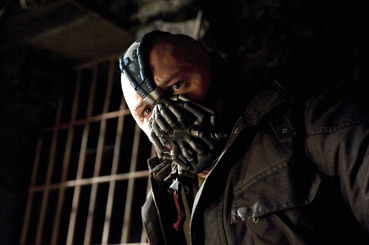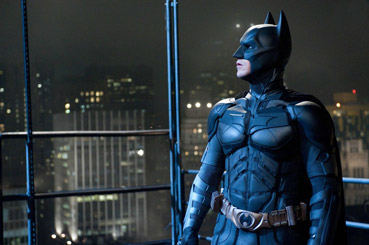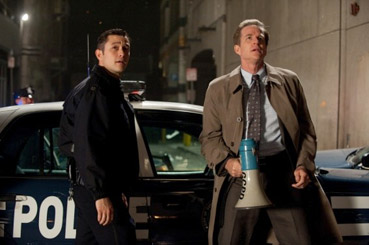Note: While writing this review, it was reported that a gunman opened fire during a late night screening of The Dark Knight Rises in Denver, Colorado killing twelve people. Just a few miles from Columbine High School, the shooting resulted in the worst death toll on US soil since the 2007 killings at the Virginia Tech Campus. This news adds nothing to the review but mentioning it seemed the right thing to do under the circumstances. Right now that news story is all too fresh.
| |
"To me, a beautifully executed film is a movie where the sum of all the images leaves a lasting impression on you, rather than the individual shots. It's how you use cinematography to tell a story." |
|
Director Christopher Nolan |
And so to the anticipated Summer event movie number two. After my review of Prometheus, several friends accused me of being too lenient as if a film stands in the dock hoping it doesn't get thirty years to life. Yes, in hindsight I gave Ridley and co. the benefit of many doubts and stupidities of character and narrative (I was excited and swept away by what turned out to be a misplaced and miserly rewarded enthusiasm) but I can make up for that in a future Blu-ray review. Going in to The Dark Knight Rises after the grown up glory of The Dark Knight, I seemed to be leaning the other way ever so slightly. Let's state up front that there was no way this film was going to be anything other than brilliantly executed cinema. It was going to be intelligent in a way blockbusters rarely are and it was going to round up a fascinating trilogy. In 2008, the Joker knocked me out (if I may quote from a companion article to our review all those years back);
"Understanding the Joker is not the point. So why in the movie does almost everything he says ring so true about the human condition?"
That was Heath Ledger's trump card despite the ghoulish make up and disregard for human life. He made sense. And now we come to Bane (the maxim that a movie is only as good as its villain is true in my experience); he's a super-ripped, painkiller supping beast, Batman's intellectual equal and some time physical superior. Bane seems to want to lead a revolt, a fully-fledged revolution akin to that little matter in France, a brouhaha that spanned over a decade at the end of the 18th century. This motive seems... small time. For so many huge events leading up to Bane's take over, the resulting drumhead trials against the rich and the has-been authorities ("Exile or death?") seem almost trivial. It's like training for the Olympics (sorry but the games are pervasive, I can't imagine why) to take a single step in a race and then bow out. There are plenty of things to enjoy about Bane's hold over Gotham if you're class minded and want to see the privileged suffer but as the chief adversary sits apart from the results of his labours (the people's voices must be heard), his effect as a villain is somewhat diluted.

There are moments when the movie is asking us to believe he's a freedom fighter of a sort. And what does he know of Gotham's wants and desires having been holed up in an un-named and un-located prison all his life? Ledger set the bar so high for 'anarchic but strangely attractive terrorist' that no actor or character was going to reach it while in the confines of Nolan's Gotham. That said, Bane is well played by Tom Hardy and despite his physical commitment and obvious talent in other roles, I wondered why Nolan didn't just cast a naturally 'big' man. Yes, the eyes have it (in terms of performance) but Bane is all about the swagger and iron strong confidence. We get few close ups where Hardy's eyes are the readable feature. Why get an actor to bulk up, just to see his eyes? That said, Hardy convinces as a psychotic strategist happy to let the basest human nature take its course once its society is stripped of the trappings of authoritative control, wealth and privilege.
It's eight years after the events of The Dark Knight and Commissioner Gordon (a warm but inwardly tortured Gary Oldman) is the only character, save Batman himself, who knows the truth surrounding the fate and actions of Harvey Dent and Batman's subsequent demonization. There's Blake, an idealistic cop sniffing around for the truth (Joseph Gordon-Levitt) who has logically deduced Bruce Wayne's secret identity. Wayne Industries is stagnant (although Batman's hi-tech trappings are all still available with one significant aerial addition) and Bruce himself is a limping shadow of his former selves. After a robbery inside Wayne Mansion involving a sleek and agile 'cat' burglar, Bruce is brought back into the game. After a spectacular (and shot mostly 'for real') mid -air hijack and rescue, the prison-born brute, Bane, leads a mercenary gang, each member of which seems too easily willing to die for this masked monster. They take residence under the streets of Gotham. After Batman is defeated and imprisoned, Bane cuts Gotham off from the rest of the country and chaos and impending nuclear doom ensue...
The Dark Knight Rises has a bigger villain than Bane, a nemesis unseen but always present, a force to be reckoned with that no blast from the Tumbler or punch from the caped crusader can impede. Let's give it a name; anticipation. I have such high regard for the Joker's outing in the franchise that I was a little nervous how Nolan and screenwriting partner-brother Jonathan were going to round off the story. Pleasingly, they returned to the genesis of the eponymous hero and how his origin and its context had reverberations down through the years. This is satisfying but what grated just a tiny bit was the 'end of Gotham' scenario that has to be stapled on to the emotional needs of the story. Whatever happens in a Batman movie (or a Nolan Batman movie), Batman must have a primary hand in saving the city from villainous excess and comic book ambition. On that subject, you could probably buy a really nice house in Gotham City for a steal. Saving Gotham is Bruce's reason d'etre for donning the Kevlar. And in a second sequel, this can get tired as a blockbuster requirement. When are we going to lower the stakes and still make them more emotionally resonant? Ah, but that would mean the need for fewer action sequences and special effects – couldn't have that. After all, there is some truth to Mr Spock's pointed barb to Doctor McCoy in the original series second season Star Trek episode The Immunity Syndrome... "I've noticed that about your people. You find it easier to understand the death of one than the death of a million." If that's true then don't risk millions, risk one of two we really care about.

Having said that, the spectacle on offer as Gotham falls is superbly realised. Bane disposes of the bulk of the police force with a strategy that would make Rommel blush and carefully placed explosives turn New York (sorry, Gotham) into a self-contained prison ironically home to those once locked up from crimes that fell under the eight year old, draconian laws initiated by Harvey Dent. Just how Bane's mock up of the Bastille is the setting for an enactment of 'the will of the people' escapes me right now. His political agenda seems half-hearted when we learn that a device has been primed to explode after an arbitrary time period (just long enough for Batman to realistically heal from his savage beating, naturally). The one image of the film that truly coaxed the goose bumps was widely quoted in the trailers and on some advance posters. Bane has pummelled Batman, his secret identity no longer secret and the brute walks away, Batman's smashed mask in hand. Bane discards it with such contempt and matter-of-factness, it seemed inevitable that this must be the finale of the franchise. Moments like this, even with no ulterior meaning implied, can sometimes shine in a film for no other reason than they just do. There was something so pleasingly final and breathlessly ironic about the short walk, so much so that my inner geek squealed with delight.
Ann Hathaway plays Selina Kyle, aka Cat Woman. Lithe and athletic, she inhabits the role comfortably and makes a furry, purring mockery of the word ambiguous. She's a simple but ultra-capable thief who wants her criminal record expunged (how about that for a criminal's ambition?) Is she Batman's friend or foe or both? It may be significant (who knows) but my 15 year-old did ask the following question after the screening and I must admit that, apart from her involvement in two narrative points, he had one himself; "Why was Cat Woman even in the film?" This is Nolan giving in to demographic requirement (or more leniently, this is probably what Warner Brothers wanted – a sexy female to offset all the testosterone). She's attractive and vivacious but there is very little for her to be involved with given the narrative and she feels like a very good-looking addendum. Her fellow female thespian (are we allowed to say 'actress' anymore?) Marion Cotillard, plays business woman Miranda who's tied up with the Wayne family business and unhappy about Bruce's retreat into Howard Hughes psycho-territory. In Shakespeare's The Tempest, Miranda is an innocent girl raised on an isolated island by her magician father. This makes some sense but you'll have to see the movie to figure out exactly why.
Wally Pfister's cinematography is, as ever, crisp and precise (if he ever favours hand held for a scene, it's precise hand held...) and Gotham's winter is presented so starkly that you can feel the chill. The whole look of the movie has a gun-metal grey tinge, a pallbearer's veil cast over the city. Lee Smith's editing is suitably invisible with no action sequence suffering from 'mustcutitis'. That's a big 'Phew!' from this end. The only technical issue I had may have been cinema specific. During the screening there was definitely a problem with a main speaker to the left of the screen but I can't blame that on a fundamental problem in modern cinema-going. Let's say you're the director. You're sound mixing and you will have heard run-throughs of the sound mix a few hundred times. If you are a good director, that number will probably be closer to a thousand. Let's take a line from Bane (and any other character would be just as relevant. I'm not complaining about Bane's voice in particular, a feature of the pre-release online nervousness). How about "Let the games begin." That's nice and simple. You hear that a thousand times and there's no way you can be convinced it sounds like anything else. One small problem. Ninety percent of cinemagoers will hear the line once and if you don't catch it, you lose the line but crucially you lose whatever plot point is hinged on that line. For me personally (and I agree this is my problem not Christopher Nolan's) I missed about a quarter of the dialogue. My son and I were regularly exchanging "What did he say?" questions throughout the screening. That's not good. I was suitably immersed but I could have been better informed if my ears and to some small extent, the presentation of the mix hadn't let me down.

There are precious few blockbuster film-makers out there that have your entertainment interests at heart and who also accommodate your wits and intelligence. These diamonds among the fluff are truly committed to telling the best story they can despite the predictable and tiresome demands of the Hollywood machine. Christopher Nolan may be unique among his peers in delivering smart mega-movies while simultaneously drumming up happy numbers for the studios and long may his taste and choices unite art and commerce so that everybody wins. That said, I'm quite looking forward to a second viewing. Maybe then I'll catch Blake's full name and not rely on my son to point out a very nice piece of circular Bat-mythology resolution. While I feel that The Dark Knight is still the best of the three, its sequel, a superbly crafted variation on a theme, The Dark Knight Rises still comes highly recommended.
Postscript;
On a purely personal note, I'd like to ask two open questions. Cinematographer Wally Pfister originally wanted to shoot the entire film in the IMAX format (both he and Nolan are not big fans of 3D). The IMAX sections in the previous The Dark Knight were jaw dropping. A good fifty minutes of Rises was shot in IMAX and the reason given for not shooting the entire film in this format was that the noise the IMAX cameras made would interfere with the sound recording of the dialogue scenes. Two things; one, I find it hard to believe that there are no hi-tech, lightweight blimps available to muffle a large percentage of the IMAX camera noise; two, if the entire soundtrack (or a large percentage of the soundtrack) of mega-movies these days is almost always re-recorded after the event in a nice quiet sound studio, why the concern about camera noise during shooting? Is Nolan saying that he actually uses some recorded dialogue at the time of shooting in the final mix? Let me check the credits... There are several ADR credits – automated (or additional) dialogue replacement (or recording); ADR is the practise of re-recording an actor's lines for clarity. In the old days, this was known as 'looping' as the piece to be re-recorded was put on a loop of film and the actor had several cracks at the line over and over again. Just because the credit is there doesn't mean that Nolan didn't use some originally recorded sound. I'm just curious.
|